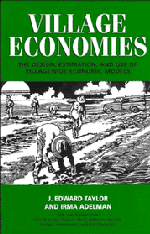Book contents
- Frontmatter
- Contents
- Acknowledgments
- 1 Introduction
- 2 Modeling village economies
- 3 The village economy and tenure security in West Africa: A Senegalese village SAM
- 4 Production and distribution in a dry-land village economy
- 5 Migration and the changing structure of a Mexican village economy
- 6 Economic linkages in a small regional economy: The case of Kutus Region, Kenya
- 7 Household nutrition and economic linkages: A village social accounting matrix for West Java, Indonesia
- 8 The village CGE: Basic model and estimation
- 9 Policy simulations
- 10 Conclusions
- Bibliography
- Index
10 - Conclusions
Published online by Cambridge University Press: 05 June 2012
- Frontmatter
- Contents
- Acknowledgments
- 1 Introduction
- 2 Modeling village economies
- 3 The village economy and tenure security in West Africa: A Senegalese village SAM
- 4 Production and distribution in a dry-land village economy
- 5 Migration and the changing structure of a Mexican village economy
- 6 Economic linkages in a small regional economy: The case of Kutus Region, Kenya
- 7 Household nutrition and economic linkages: A village social accounting matrix for West Java, Indonesia
- 8 The village CGE: Basic model and estimation
- 9 Policy simulations
- 10 Conclusions
- Bibliography
- Index
Summary
Income linkages among agricultural households are instrumental in shaping the impacts of policy, market, and environmental changes on production, incomes, and migration in LDC rural economies. Microeconomic householdfarm models, the cornerstone of microeconomic policy analysis over the past decade, do not take these linkages into account. Fixed-price village multiplier (SAM) models generally exaggerate them. The villagewide economic modeling approach presented in this book was designed to capture linkages among household-farms while taking into account resource constraints and the diversity of production, market, and institutional structures that characterize rural economies in developing countries.
Our findings from village and village-town models illustrate the influence local factor and product market linkages exert on shaping policy, market, and environmental impacts. At the same time, our studies dispel any notion one might have that villages are isolated, closed economies. Although situated in vastly different economic, cultural, and environmental settings, the villages we studied are integrated into regional, national, and, in the case of international migration, global markets. All are affected by changes in external markets and government policies. Linkages with the outside world are more important to village economies than they are to the most open national economies. Even in Senegal, the least developed of the five villages we studied, village imports are 42 percent higher than village production, and migrant remittances constitute more than 31 percent of total household income. Not only are these villages not isolated economically; they are not isolated in terms of information about the outside world.
- Type
- Chapter
- Information
- Village EconomiesThe Design, Estimation, and Use of Villagewide Economic Models, pp. 247 - 253Publisher: Cambridge University PressPrint publication year: 1996

